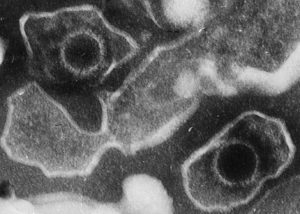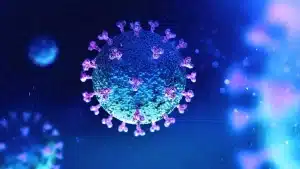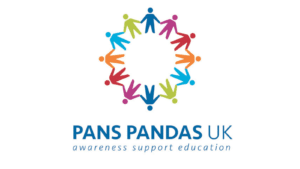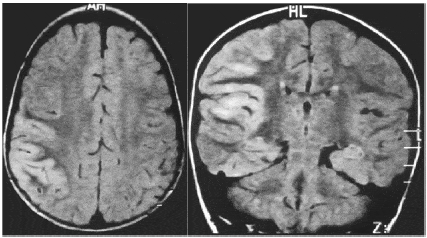CONTACT
We will reply as soon as possible.
Enevia Health, LLC
30 N Gould Ste N, Sheridan, WY 82801, USA
When reading the title you may wonder: How is it possible for the body itself to attack the brain, if it is a part of it? We tell you.
Two years ago, Fleur, then 14, was considered by her teachers to be on track to study mathematics at Oxford University. A bright child, she was also the fun hub of a group of girls at school. He loved playing hockey and tennis, as well as practicing the trombone and piano.

The only problem on Fleur's horizon was a recurring problem with glandular fever. Four episodes in two years had sapped some of his energy. Blood tests by a pediatrician had found evidence of a series of infections with the Epstein-Barr (EB) virus, a member of the herpes family that causes glandular fever.
But it was another viral infection that had a devastating effect, leading to serious neuropsychiatric problems including hallucinations and self-harm, says his mother Helen, 56, a finance director and married mother of two.
Fleur, now 16, has not been able to return to school full-time since.
In January 2022, Fleur, from Banstead, Surrey, contracted Covid-19.
“Just before testing positive for the virus, he started making these extraordinary movements, like squirming and flailing, along with extreme verbal outbursts that included some terrible obscenities,” Helen told Good Health.
"Us [my husband David and I] We wondered what was happening. “Everything was so out of place.”
A month after the sudden outbreak of physical and verbal symptoms from the virus, Fleur saw a psychiatrist who told the family that he suspected Fleur had PANS (Pediatric Acute Onset Neuropsychiatric Syndrome). "We'd never heard of it," says Helen.
PANS is believed to be caused by an overreaction of the body's immune system to a virus infection. It then attacks brain cells and causes significant inflammation. Symptoms often involve a sudden outbreak of verbal and physical tics, as well as mental health problems such as obsessive-compulsive disorder, where people have recurring, unwanted thoughts, ideas, or sensations and feel driven to ritually repeat activities to maintain These obsessions under control.

A subset of PANS, PANDAS (pediatric autoimmune neuropsychiatric disorders associated with streptococcal virus infections) is specifically related to infection with the group A streptococcus bacteria, which is very common and causes conditions such as sore throat, impetigo, and scarlet fever.
Something similar is known to occur in adults, where infections such as those caused by the herpes virus can cause brain inflammation called Encephalitis, which in turn can cause psychotic symptoms such as hallucinations and self-harm (even simple urinary tract infections can cause problems). cognitive disorders such as confusion in older people).
PANS and PANDAS were first reported 25 years ago by researchers at the US National Institute of Mental Health in the American Journal of Psychiatry. The World Health Organization first recognized the existence of the conditions in 2018.
However, the existence of these conditions has been controversial (in fact, the NHS website has no information on either) and they have only been officially recognized by the UK Government in recent months.
Fortunately for Fleur, the psychiatrist was aware of the condition and quickly recognized it. After her appointment, Helen located the PANS/PANDAS UK charity community page on Facebook, where she learned more about how the family could help Fleur.
“We were lucky that our Bupa family health insurance paid for us to see a private consultant immunologist who is a leading PANS expert in the UK,” says Helen. The protocol to rule out the disease is highly expensive, involving expensive blood tests.

"From diagnostic tests, such as blood tests, it appears that when Fleur contracted the Covid virus, her body's immune system response was already dysregulated due to the Epstein-Barr virus," Helen continues. His immune response to contracting Covid involved a seriously harmful immune overreaction that began attacking his brain.
"But if you go to the NHS, they will most likely tell you that neither PANS nor PANDAS exist and that your child has a psychiatric disorder or autism," he says.
If it's the former, your child will be prescribed powerful psychiatric drugs and left at the bottom of a years-long waiting list for a consultation with NHS child and adolescent mental health services.
However, in most cases, a simple two-week course of antibiotics will treat the body's response to the infection and resolve PANS/PANDAS symptoms significantly or completely. Some children may also need anti-inflammatories such as ibuprofen or corticosteroids.
Recovery can be extraordinary, says Dr Tim Ubhi, an NHS consultant pediatrician at Darlington Memorial Hospital, where he runs one of the few clinics treating children with PANS and PANDAS.
“There is a huge improvement: we have patients who have had symptoms for years and they recover,” adds Dr. Ubhi, a member of the specialist group behind the UK PANS/PANDAS Doctors Network, created in 2018 to help to raise awareness about these conditions.
The first step should be a thorough investigation to rule out other causes, he adds.
And the delay in diagnosis (and treatment) can be significant. Helen says: "Experts have told me that it takes twice as long to cure the disease as the time between onset and proper treatment."
By the time Fleur's diagnosis was confirmed in July 2022, her condition had deteriorated so much that she was self-harming, suffering psychedelic-like hallucinations up to nine times a day, and occasionally becoming mute.
'From time to time his legs stopped working. I couldn't physically leave her alone because she would panic," says Helen.

Even though families like Helen see neuropsychiatric symptoms develop literally overnight in previously healthy children, many of those affected have been told or dismissed by leading medical authorities that the symptoms are entirely psychological. as driven by parental hysteria or even abuse.
In a 2020 survey for the charity PANS/PANDAS UK, 95 per cent of parents whose children suffered from these types of symptoms said their family doctors had not offered them a diagnosis.
Things were not much better among the specialists. About half of the pediatricians surveyed said they had never heard of the disease.
“We know of children separated from their parents over allegations of abuse due to their children's behaviour,” says Robin Millar, Conservative MP for Aberconwy, who chairs the All Party Parliamentary Group on PANS and PANDAS.
"Another fundamental problem is that this clinical condition is often misdiagnosed as a mental health problem, which is worse than having no diagnosis at all," he told Good Health. Millar has been campaigning in parliament for UK medical authorities to officially recognize the disease, to pave the way for better diagnosis and treatment.
He had previously been alerted to the conditions by a mother in his constituency who was seeking medical help for her teenage son.
'She showed me videos of him showing extraordinary distress, screaming and scratching. “I could see the pain and the emotional impact on her.”
In September, he made a crucial breakthrough when, in response to his parliamentary questions, then Health Minister Maria Caulfield declared: "We have the evidence to sufficiently demonstrate that PANS and PANDAS are discrete disease entities." In other words, recognize them as genuine individual medical conditions.
Millar says, "This was truly a momentous moment." For the first time a government minister recognizes that these conditions exist. The key issue is to recognize that it is a disease that in many cases can be treated effectively.'
Millar is campaigning for government funding to study a large cohort of children with these viral conditions. 'The fact that the vast majority of doctors do not recognize these conditions would change if they were recognized in an accredited journal. It could also help guide them about treatments.” Vicky Burford, who set up the charity PANS/PANDAS UK in 2018 after her then 12-year-old son was affected, said that while Maria Caulfield's announcement was "very welcome" and that it seems to be turning the tide is changing, "it is not changing fast enough." ,' she says.
"We have 6,000 people in our Facebook support group, all people looking for answers after their children suddenly developed unusual symptoms that doctors can't seem to treat."
And he warns: "Many of the symptoms, such as anger, self-harm, and enuresis, can be seen as red flags that will cause a professional to think there is possible abuse in the home, rather than thinking it could be PANS or PANDAS." ».
'If you don't get a doctor who has knowledge about the disease, they won't diagnose you. But in the universities of the United Kingdom there is no training for this diagnosis,” he explains.
"NHS England told us it was delivered by the Royal College of Paediatricians, but in the course material there is only one line mention that PANS/PANDAS is potentially an alternative cause of tics in children."
But awareness has improved in the past five years, says Dr Ubhi, clinical director of Children's e-Hospital, a private online health service.
Previous surveys suggested that up to 90 per cent of GPs had not heard of either disease, but it says more doctors are now referring patients for treatment.

Meanwhile, researchers around the world are trying to pin down the biological mechanisms behind PANS and PANDAS, understand how they develop, and refine new therapies.
The consensus is that the trigger is a viral or bacterial infection that causes the immune system to overreact and attack brain cells. In a study published in the journal Brain, Behavior, and Immunity in 2018, researchers at Yale University and the U.S. National Institute of Mental Health extracted antibodies from the blood of children with PANDAS and injected them into laboratory mice. ; They discovered that the antibodies attacked neurons in parts of the brain associated with the control of physical movement and that are related to tic disorders.
Currently, in the United States and Sweden, the pharmaceutical company Octapharma is conducting clinical trials of a type of antibody called immunoglobulin. This is administered intravenously in the hope that it will displace brain-damaging antibodies and stop inflammatory processes.
In fact, the idea that virus infections can seriously affect people psychologically is not new.
As the Mail's leading columnist Dr Martin Scurr explains, this is a recognized effect of urinary tract infections (UTIs) in older patients: "when a patient suddenly and inexplicably becomes confused or simply cranky." and does not cooperate.
"Although you have to check first to rule out a stroke or cardiac event, most of the time a urinary tract infection is the common cause of this change in older patients," he says, adding: "I remember very vividly being called to see to a retired colleague, aged about 80 on a hot Sunday afternoon after having been missing for a few hours.
In the end the police took him home and found him just a kilometer or two from his house, parked in a state of some confusion. He had a urinary tract infection and two days after starting antibiotics, he made a full recovery.
Recent research suggests that confusion related to viral urinary tract infections may be related to elevated levels of an inflammatory protein that is part of the immune system, and that this can attack brain cells.
On the other hand, the idea that a patient's own antibodies attack their brain after a virus infection is already established in a type of encephalitis (brain inflammation) that affects adults after a viral infection such as herpes. It can cause severe psychosis which, again, can manifest as hallucinations and self-harm.
Belinda Lennox, a professor of psychiatry at the University of Oxford, has spent more than a decade pioneering the treatment of post-viral encephalitis and, in particular, a form called anti-NMDA receptor encephalitis, an autoimmune disease identified in 2007. .
This type of sudden-onset encephalitis is caused by people's own immune system attacking message-receiving cells in their brains called NMDA receptors, Professor Lennox told Good Health. "These receptors regulate fundamental brain functions," he explains.
"It appears that patients' immune systems are mistakenly prompted to attack these NMDA receptors when they respond to certain viral infections such as herpes simplex, which can look similar to the NMDA receptor."
Over the past ten years, his clinical team has been able to cure postviral encephalitis patients of their frightening psychiatric symptoms by treating them with medications such as steroids that suppress the immune system's overreactions.
However, he says, his results have failed to impress the general medical world, even though his team has published individual case reports of positive results with 30 patients.
That's why it has now embarked on a "gold standard" randomized clinical trial in people with sudden-onset psychosis.

"We are giving them intravenous immunoglobulin [as is being tested with PANS], and also rituxamab, a drug used in another autoimmune disease, rheumatoid arthritis."
"Almost everyone we've given the treatment to improves, although some people's bodies can't tolerate it," he says.
Dr Thomas Pollak, a neuropsychiatrist and senior clinical lecturer at the Institute of Psychiatry, Psychology and Neuroscience at King's College London, takes a similar approach. She runs a clinic for people with suspected autoimmune encephalitis and other autoimmune brain conditions that can present with psychiatric symptoms.
"We see about 50 patients a year: people who have had acute onset of psychosis, major depression, mania and extreme anxiety disorders," he told Good Health. 'They have been given a psychiatric diagnosis and treated accordingly.
"Approximately half of patients with anti-NMDA receptor encephalitis have been admitted to psychiatric wards, and often they have also been hospitalized and treated with powerful antipsychotic drugs."
"Generally, they only send them to us if an enthusiastic young doctor examines their case or if the patient subsequently develops more neurological symptoms that their teams think are abnormal," he adds.
"But we don't know how many cases we may be missing: people languishing in psychiatric units or receiving potent and inappropriate medication in the community, when it would be more appropriate to give them immunomodulatory drugs," says Dr. Pollak.
Fortunately for Fleur, with the right help there have been significant improvements in her condition.
"If she hadn't been diagnosed with PANS, I have no idea what we would have done other than allowing Fleur to be put on powerful but useless antipsychotic medication," says Helen. "Instead, PANS specialists aim to stop the autoimmune attack and the resulting inflammation."
«We have seen crucial improvements. He still has some tics, but nothing like before,” says Helen. «His fatigue levels are much better, so now he can do activities like making pottery and he sleeps through the night; In the worst case, the anxiety and stress were so intense that she didn't sleep until 4 in the morning and I had to stay with her.
'That being said, she is still a shadow of her former self. Everything has been very dark and terrifying for her, at a time in her life when she should feel freer.
«Since all this started, he has not been able to go to school in any meaningful way. Fortunately, cognitively he is still fine.”
Worst of all, Helen says, is thinking that "if Fleur had been diagnosed and treated quickly, she might have been fine within weeks." It's heartbreaking to think about.
"Medical thinking needs to be updated to appreciate the damage that the immune system can cause to the brain."
Professor Lennox agrees. For adults, he says, “I want antibody testing to become routine across the NHS,” he says. "It should be part of basic medical thinking when someone presents with a new, sudden-onset postviral mental illness that does not improve with standard treatment, such as antipsychotics."
Would you like more true stories like this? Follow us on our social networks and on our YouTube channel, where we will always be uploading relevant information as well as Blog articles through: www.eneviahealth.com
Instagram: https://www.instagram.com/enevia_health/
LinkedIn: https://www.linkedin.com/company/enevia-health/?viewAsMember=true
Facebook: https://www.facebook.com/eneviahealth
We will reply as soon as possible.
30 N Gould Ste N, Sheridan, WY 82801, USA
Our groups are the ideal platform to learn and share your scientific concerns about neurodevelopment issues
*Our purpose is informational only, it is not intended to be a substitute for medical advice, diagnosis or treatment.
We are working on our website. For any queries, you can contact our customer service team at atencionalcliente@eneviahealth.com